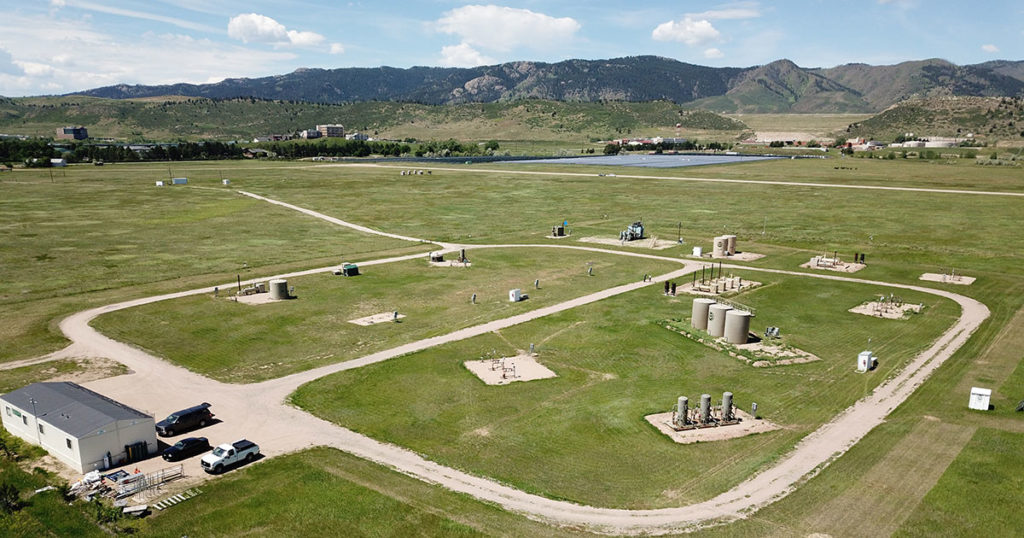
Adapted from a University of Texas at Austin news release.
Colorado State University methane experts are partners in a $50 million research and education initiative aimed at improving how tracking and estimates of greenhouse gas emissions occur across the oil and natural gas industry.
CSU researchers led by Daniel Zimmerle, director of the CSU Energy Institute’s Methane Emissions Program and of the university’s Methane Emissions Technology Evaluation Center, are co-founders of the new Energy Emissions Modeling and Data Lab, headquartered at The University of Texas at Austin with additional partners at Colorado School of Mines.
The $50 million initiative, sponsored primarily by oil and gas companies, will address the growing need for accurate, timely and transparent accounting of greenhouse gas emissions across global oil and natural gas supply chains. Data and analysis from this new endeavor will help both public and private institutions develop climate strategies and actions informed by accurate data, identifying both opportunities for emissions reductions and verification.
The new partnership with UT Austin and Mines is an outgrowth of a longstanding research collaboration in which Zimmerle and others have used measurements to improve emissions accounting from oil and gas supply chains. Their approach, born out of over a decade of research, is a combination of modeling and direct measurement to achieve accurate estimates of methane, a harmful climate-forcing gas, emitted into the atmosphere from production and transport of natural gas. The sheer magnitude of the natural gas system has made accurate accounting a challenge, with competing estimates often disagreeing by factors of two or more.
“There’s always been a gap between an emissions inventory, which people come up with by counting widgets and multiplying by a number of emissions factors, and the measurement side, which provides snapshots of emissions but doesn’t say what’s going on 24-7. The research goal is to merge these ‘apples and oranges’ to come up with a fruit salad that is better than either type of ingredient,” Zimmerle said.
Greenhouse gas emissions from oil and gas supply chains
The Energy Emissions Modeling and Data Lab will work to establish comprehensive, reliable, transparent, measurement-based greenhouse gas emissions assessments of oil and gas supply chains. The research – consisting of software tools and emissions datasets – will be open source and updated regularly. The lab will also offer education and training programs to help oil and gas operators, government agencies and other stakeholders utilize the tools and data.
The initiative will be co-led at UT Austin by Cockrell School of Engineering faculty members Dave Allen and Arvind Ravikumar. Partnering with CSU and Mines, they will run an affiliates program to foster strategic partnerships with global universities. Collectively, the three institutions have conducted methane emissions measurements at over a thousand sites and published several dozen peer-reviewed studies.
Several major energy companies that are also focusing on the accuracy of emissions data are partnering with the new lab, including Cheniere, EQT and Williams. Each company will contribute $5 million over five years to the initiative, with more stakeholders from the oil and gas industry, financial sector and non-governmental organizations expected to join in the near future.
“If you remove methane emissions from the global energy sector, you get a reduction in warming that is equivalent to taking more than a billion cars off the road,” said Allen, a professor in UT Austin’s McKetta Department of Chemical Engineering. “And it can be done much faster and often at a lower cost than other greenhouse gas reduction efforts.”
In its first year, the lab will:
- Publish a U.S. Methane Census that integrates up-to-date measurement data across U.S. oil and gas operation. The Census will be updated annually and can help stakeholders benchmark their operations.
- Develop emissions reconciliation and measurement integration tools that help companies close the accuracy gap between direct measurements and engineering estimates of emissions. This tool will integrate data from monitoring systems such as satellites, aerial flyovers and operational data.
- Create supply chain emissions analysis tools that provide estimates of methane emissions across individual oil and gas supply chains. Investors, customers and the public can use this tool to better understand emissions associated with the production and transportation of oil and gas resources.
Researchers will publish peer-reviewed journal articles and reports aimed at U.S. and international regulatory agencies, as well as provide emissions data for partner companies. The researchers will work with Texas Engineering Executive Education to develop training and workforce development courses for the public. The inaugural course, Methane Emissions in the Natural Gas Supply Chain, happens virtually March 22 and 24.
First public event: virtual workshop
The lab’s first public event will be a virtual workshop to illustrate the use of models to advance methane regulations. This virtual workshop will take place at 11 a.m. Central Time, Jan. 18, via Zoom and is open to the public. It will focus on the use of the Fugitive Emissions Abatement Simulation Tool (FEAST) model in the supplemental methane rule proposed by the U.S. Environmental Protection Agency.
The work of the new lab will be performed within a broader global context of the need for reduction of methane emissions across many sectors, not just oil and gas. More than 100 countries, including the U.S. and European Union members, have pledged to reduce methane emissions by 30% by 2030 as part of the Global Methane Pledge. Research from the lab will provide analysis and datasets in support of the objectives of the Global Methane Pledge and work collaboratively with other methane initiatives such as the UN International Methane Emissions Observatory.
What’s more, recent regulations in the U.S. such as the Inflation Reduction Act and rules proposed by the Environmental Protection Agency mandate the development of measurement-based greenhouse gas emissions inventories. U.S. and global customers of natural gas such as utilities and liquefied natural gas consumers, as well as the financial sector, are asking for better accounting and transparency related to supply chains emissions.